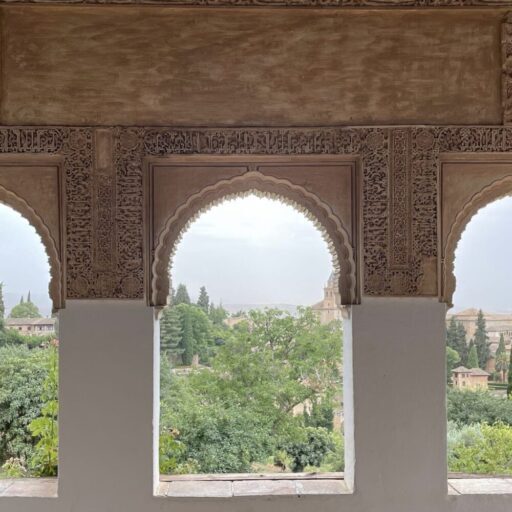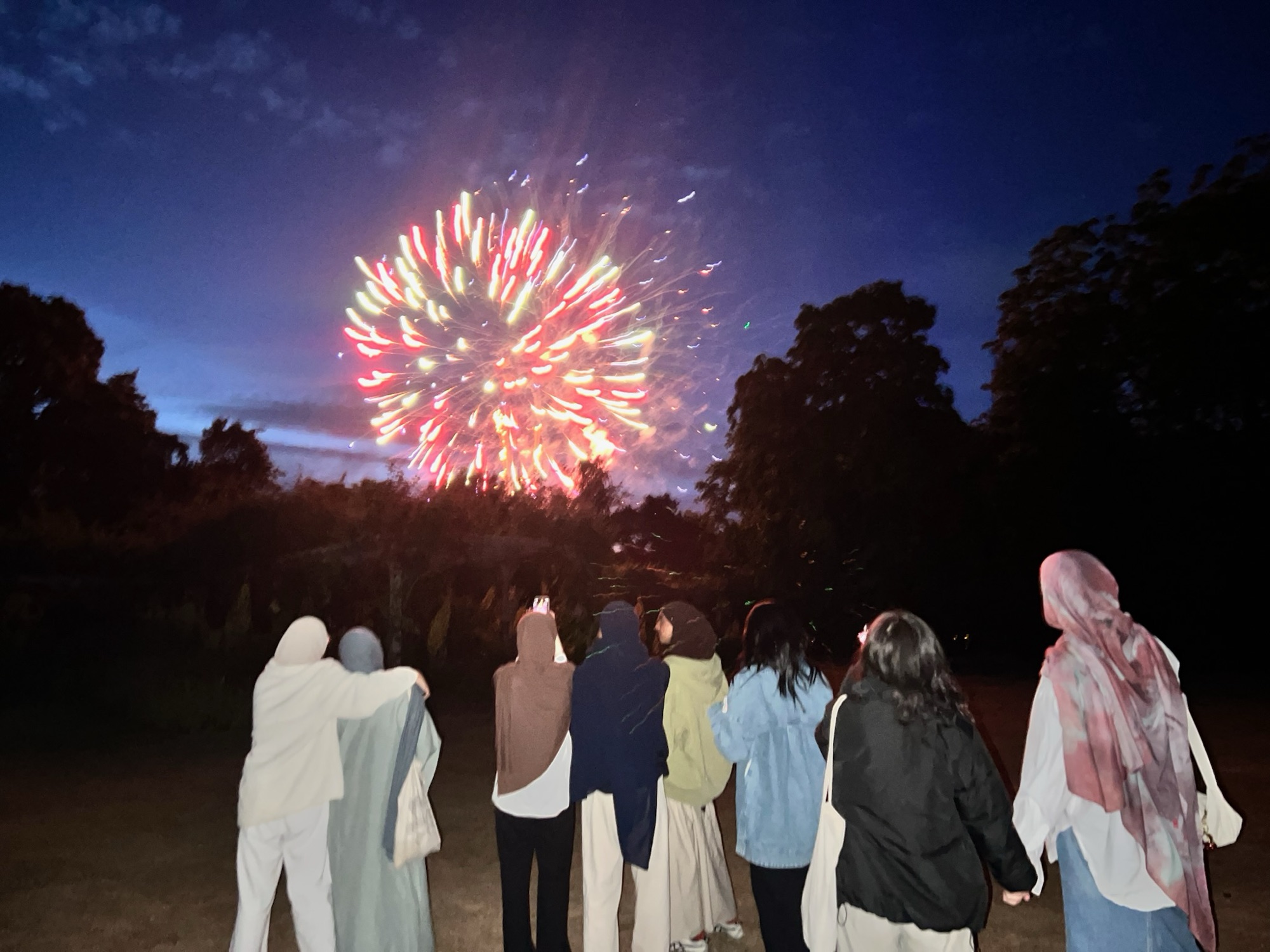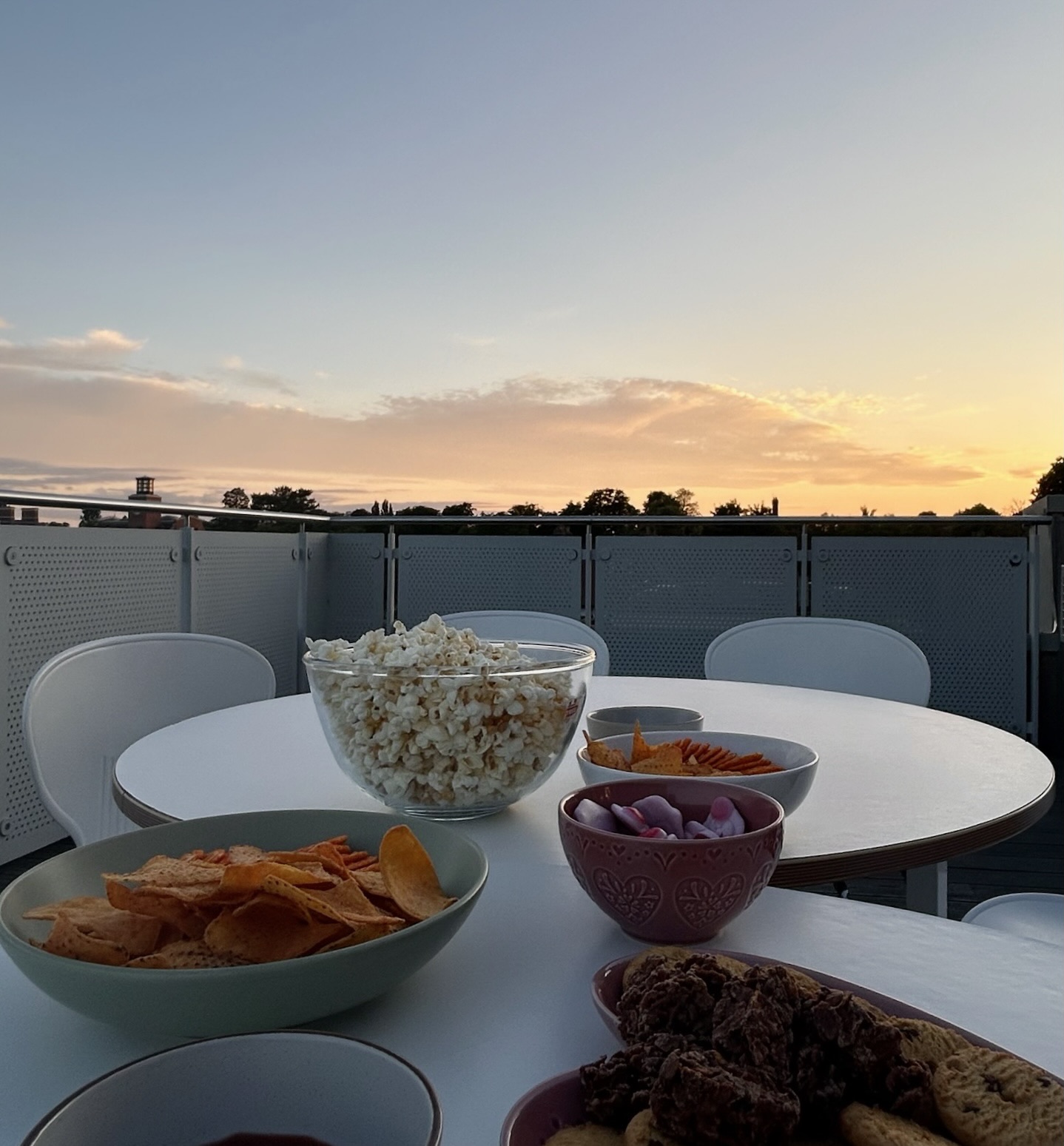Names have been changed for anonymity.
Gathered together, it feels fitting to begin with the wonderful community we have cobbled together for ourselves. The evening is slightly chilly, and the promise of sunset teases the sky into a soft orange. We’ve dragged every chair we could find outside and arranged them around two tables, warping our round table into more of a misshapen oblong.
What do we owe to each other?
“I think sincerity and effort”, Elaha begins. This resonates with all of us, as endless moments spring into mind: sharing clothes, supplying company whilst studying, buying each other brunch and endless caffeinated drinks. Sana’s unwavering hospitality and generosity is immediately brought up, from conjuring meals out of thin air for all who turn up at her door, her infamous snack draw—“or like bro, what do you mean you’re braiding my hair?”, Rumaysa chimes in with mock incredulity. We have all felt the touch of her sincerity, that ability to draw the same blanket of warmth over all shoulders. Elaha continues: “You feel like the main recipient, but I bet everybody feels like that”. Indeed, amongst a growing atomisation, exacerbated by the necessary self-reliance of living alone, of never being quite able to drop your shoulders, that sincerity and generosity provide us all a safe space to fully breathe out. In any community, we owe that safety to each other.
Expanding beyond our individual friendship groups, Asma emphasises the importance of genuine inclusivity, an “openness in terms of how you welcome an individual”. Especially in an Islamic community that is objectively South-Asian dominant, it is easy for some on the table to feel underrepresented, or not adequately made space for. Dominant cultural norms can easily slide into universal assumptions, alienating minority voices.“Our binding similarity is Islam. It is not the colour of our skin, it is not our culture”, she adds. We must be intentional in the way we relate to, and learn from others, with a “cultural intelligence” to recognise and accept variation alongside our own personal experiences. We let that sink in, the truth of her words backed by a quiet chorus of sunset birdsong as the summer sun starts to dip beneath the horizon. The air is getting chillier by the moment, but no one seems inclined to interrupt.
“Perhaps the word ‘owing’ is misleading. Community is not based on exact reciprocity, the sort of transactional processes that guide so many of our interactions. Being there for each other is an asymmetrical, imperfect art.”
That empathy is less of a science than a companionship based on mutual tenderness. Marwa phrases it well: “in the best of friendships you need mercy with one another”. We often bond through snarky banter, so comfortable that “we will just roast each other” in a camaraderie built off mutual understanding of each other’s wry, sarcastic humour. The comfort of doing away with niceties whilst in the midst of post-essay or post-lab exhaustion. Instead, there must also be a tandem willingness to “hearing vulnerability and hearing the problems and taking on the bad”, she highlights. Community is not conditional. Its foundations rely on us as members to constantly renew our intentions to equally invest in our vulnerability, but also our willingness to remain a net for each other, and provide a listening ear without judgement or derision.
Perhaps the word ‘owing’ is misleading. Community is not based on exact reciprocity, the sort of transactional processes that guide so many of our interactions in a late-stage capitalist age of selfishness. Being there for each other is an asymmetrical, imperfect art. Sarah admits that “it is really easy to get annoyed or frustrated and wonder why [the other person] is not also putting in as much effort as you”. What we may actually ‘owe’ to each other is benefit of the doubt. Yes, “there is going to be times where one of us does a lot more…and that’s okay because there’s times when someone will need more support and lean on you”. In a social-media world, which has intentionally manipulated us into trading our social communities for individual-centered business partnerships and influencer ‘collabs’, where benefit of the doubt is traded for immediate judgement and disapproval, this forbearance and patience feels increasingly radical. From another angle, Elaha proposes, “you don’t have to break your back for community. Maybe you’re at 30% and that’s what you can give at that moment…without draining your own cup”. Combined with that patience with others is the trust that others will have the same beautiful patience with you when you need it most.
Embodying that rahmah (mercy), includes not only caring for each other in this world, but also the state of our akhiras (afterlives), by pushing each other closer to Allah. The Prophet (SAW) said:
“Allah created mercy in one hundred parts. He kept ninety-nine parts with Him and sent down one part to the earth. Through this one part, creatures are merciful to one another, so much so that the mare lifts its hoof away from its foal, fearing it might harm it.”
(Sahih Bukhari)
With our one portion of mercy we inspire each other to be better: more generous, more selfless, more forgiving. “[When] you’re in Jannah”, Rumaysa says, “you can intercede for a person, so why don’t you do that [now]? Why don’t you try and give them that hand and pull them into Jannah in this life?”. The image is evocative, refashioning mercy from forgiving each other, to also taking responsibility for each other as well. Our community reflects this: we compete to do good deeds: from ISOC clear-ups, to paying for each other, as regular hasanat (blessings) hoarders. And that collective culture refracts back onto each individual, lifting us all to goodness.
It feels like the community we’ve built is something wondrous. A feat in the making, a heady mix of having only each other in a space without our families. We rely on each other in the mundane everyday rhythms as well as the big events. But any excuse to celebrate, to gather together around a table for a roast dinner, a tea party spread, an iftar feast, we take with both hands. Sana reflects on how fortunate we are: “we’re very lucky that we have each other so close that someone can very easily text and be like, ‘Oh can you grab me this?’”. Our community is not accidental; it is an intentional layering of small kindnesses amidst extreme-sport degrees, Saturday lectures, endless essay deadlines and supervisions. The city is small enough that we can walk to each other with ease, or walk each other home in the late (or early) hours. The imperiously-gated, collegiate city has the potential to be painfully lonely. So maybe what we have managed really is a miracle.
“What we owe to each other is perhaps what we owe to ourselves: that chance to care and be cared for, to reach out and find a hand reaching back”.
The danger of feeling alone and adrift at Cambridge is perhaps merely a symptom of a larger collective condition. Our parents and grandparents quickly learnt the strength of community in an alien Britain, of finding homes in each other whilst being so far from their own. Many of us come from cultures and communities in which family remains the centre, with childhoods filled with crammed living rooms, shoes overflowing from the porch into the hallway, tables laden with food and sleepovers with cousins. “Whenever I go home, it really reminds me of the difference between an individual versus collective mindset”, Marwa observes, “My mum will talk about how a distant relative is unwell…and she’ll say ‘I need to call them’. And she’ll call them and you can literally hear in the person’s voice how happy they are that she asked after them”. In comparison, it feels harder for us to reach out when others are having a tough time. “We’ve lost that”, she continues, “we’ve withdrawn, which is a real shame”.
As much as community is becoming a dying art, just in hearing each other speak, I’m struck instead by how much, perhaps by expanding on our elders’ communities, and by creating our own rituals, we’ve been able adapt and evolve our home communities to fit our circumstances. Like them, Cambridge also has felt alien to many of us. As a traditionally white, elitist institution, only in the last ten years have we as Muslims become a prominent community, creating our own space. This community is vital and valuable for us to thrive academically, emotionally and religiously. If so, community feels less like a fixed structure than an amorphous, ever-changing ‘thing’, even a ‘being’ to which each of us are devoted. What we owe to each other is perhaps what we owe to ourselves: that chance to care and be cared for, to reach out and find a hand reaching back.
Maghrib has now well and truly begun. Before breaking for prayer and embarking on our next topic, we’re left with these final words:
“you have to give a portion of your heart into your friendships. In the world we live in today, it’s all about, ‘What can I gain from this? What would they gain from me?’, rather than that innate want to kindle those friendships based on nothing. And it comes back to the concept of selflessness and not doing things and expecting them to be reciprocated, but rather because you just want to.” (Elaha)
I hope you’ve enjoyed our words! <3


